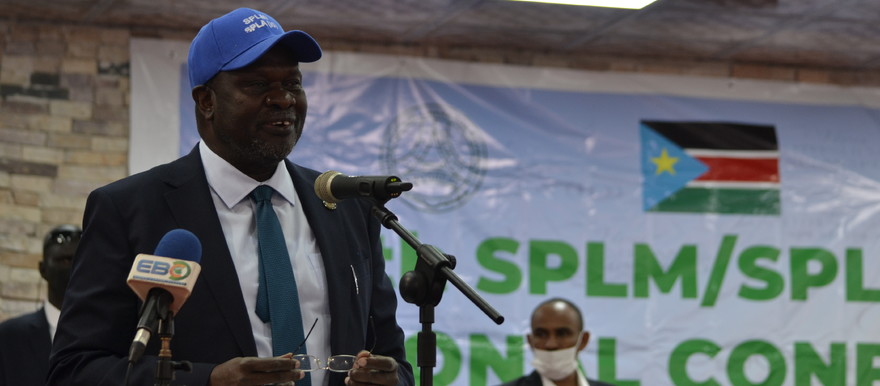Dr, Riek Machar, leader of the Sudan People’s Liberation Movement in Opposition (SPLM/A-IO) while addressing delegates at his party’s national conference on Tuesday, said a host of reasons have impacted the implementation of the peace agreement including the lack of funds and political will among peace partners.
SPLM-IO is currently holding its first-ever national conference in Juba, the 6th since the movement was formed under the theme, “building and sustaining peace through implementation of the revitalized peace agreement.” The conference runs through December 5, 2020.
In his opening remarks, Machar, also the country’s First Vice President acknowledged the slow implementation of the Revitalized Agreement on the Resolution of Conflict in South Sudan RARCSS and called on peace partners to jointly work to implement the agreement.
“While SPLM/A IO remains steadfast and committed to the implementation of the agreement in letter and spirit, we expect the same commitment from our peace partner so that we can better manage together the challenges impeding the implementation process,” Machar said.
Some of the challenges cited by Machar include; limited resources, lack of political will, lack of political space, economic crises, Covid-19, unprecedented floods, widespread inter and intra-communal violence, political and administrative vacuum in states, violations of the agreement, and the hold-out groups.
Machar also said the agreement offers the best opportunity for the country to end civil wars and political instability as well as offer an opportunity for reconciliation, healing, and development.
To achieve these goals Machar proposed the following:
“On the implementation of R-ARCSS; establishment of a fund for the implementation of the agreement and to be independently managed, direct allocation of a fixed amount from the oil revenue for the fund and call for a donor conference to support the implementation,” he said. “Hold parties accountable for actions of defectors that join them, accelerate graduation of the Necessary Unified Forces and immediately commence phase 2 of the unification of forces, ensure the timely provision of the logistics to cantonment and training centers.”
“Ensure that the Rome talks are concluded successfully, call for the appointment of the governor of Upper Nile State, kick start the economic sector and institutional reforms, establishment of the Ad hoc judicial reform committee and accelerate the establishment of the Special Reconstruction Fund, Student Fund, Social Security Fund, Women Enterprise Development Fund, and Youth Enterprise Development Fund,” he added.
On economic governance, the opposition leader proposed the following: “Put in place economic recovery programs, liberalize the exchange rate to eliminate parallel market rate, ensure prudent management of resources and compliance with public financial management regulations, combat corrupt, diversify the economy, ensure devolution of power and resources to states and counties, call for support in combating Covid-19, declare all loans and contracts collateralized or guaranteed against oil and develop a debt management strategy.”
Machar further noted that the movement will register all its members and establish offices at all levels in preparation for upcoming elections and open political cadre schools for training members.
More than 500 delegates comprising of politicians, military officers, and other representatives are attending the conference in Juba.




